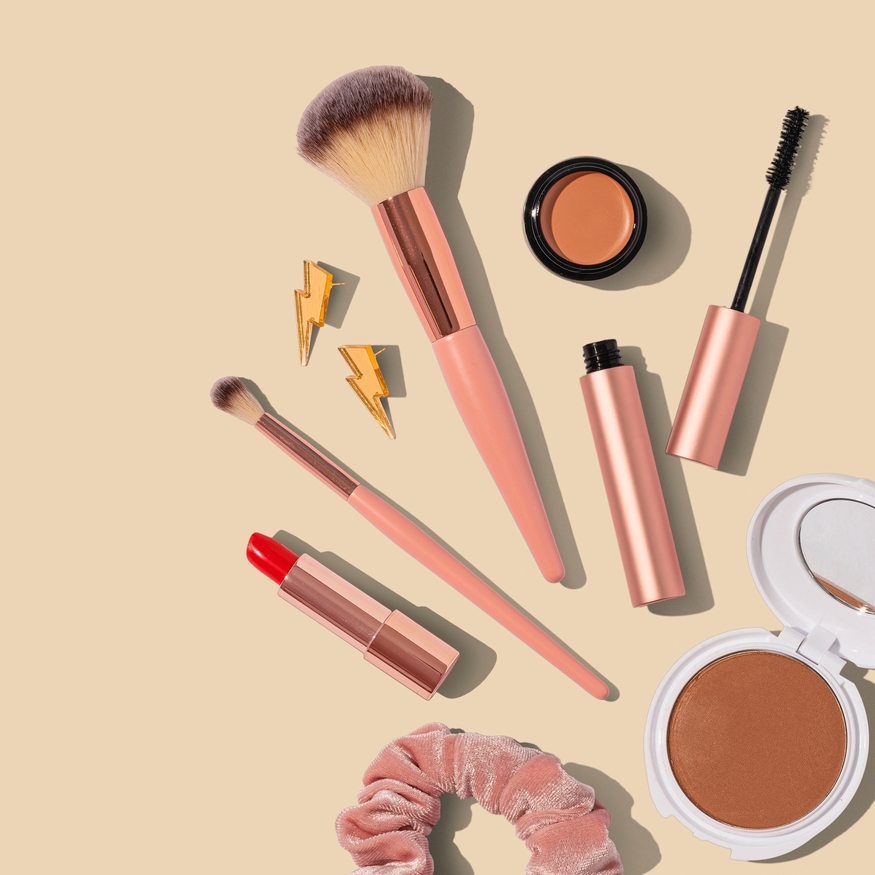
The rise of Arab Talent can be seen all over the world.
The global commercialization of Arab-owned beauty brands boasts notable touches in innovation, inclusivity and sustainability. While Arab representation and leadership in the beauty and makeup industry is still sparse, social media and globalization enable us to more easily discover fresh talented Arab talents.
Explore why below.
In the current decade, the world has become more familiar with the Middle East’s rich histories and traditions within beauty and makeup. From Egyptian women developing mesdemet blush (made of copper and lead ore) to the Turks enjoying rose water and milk baths and Argan oil (still deeply rooted in the GCC’s spa culture), the Arab world now has powerful beauty mogul ambassadors such as Huda Beauty and Mohammed Hindash dominating the 21st century via social media.
Over the years, the Middle East has shown solid growth in the beauty and cosmetic industry majorly driven by the young and aspirational population. The region’s beauty and personal care industry is estimated to grow from $32 billion (2020) to $39 billion by 2025 (Images Retail ME). The beauty industry did not suffer as much as fashion during the pandemic because beauty is more affordable and flexible in terms of market turmoil and people want to feel good during tough times, especially since the majority of the population is leveraging work-life at home. The “feel-good” retail segment, specifically in Gulf Arab countries, is something that consumers abide by as a daily routine. Fast-forward to a few years later, conversations concerning sustainable beauty, ethics, and cruelty-free products have gained more prominence. So, what is driving rapid progression in the Middle East’s beauty industry, especially in sustainable product innovation?
Several small beauty brands that have emerged over the past few years bring wellness and product innovation to the forefront. SHIFFA, meaning “to heal”, is a Dubai-based beauty brand that focuses on fresh, rich healing ingredients keeping true to its brand name. Take another Arab label like Green Bar, which hails from Bahrain. This brand conceptualizes and manufactures a wide range of face, body, and home products inspired by ancient Arabian healing culture. Ancient Arabian beauty, health, and healing scriptures highlight the guaranteed benefits of transforming the human body by establishing a relationship with the environment. Thus Arab brands like SHIFFA and Green Bar are successfully commercializing the Arab world’s forgotten wellness and beauty regimens with a modern approach. Further, as representation becomes a driving motivation in the beauty industry, an equal amount of Muslim representation has surged in this industry. 786 Cosmetics is a Halal-certified nail polish brand with a great range of colors. The brand provides porous ingredients, and alcohol/animal-free chemicals, allowing oxygen to pass through the polish, thus protecting the natural nail barrier from getting destroyed in the painting process.
The demand for vegan and cruelty-free ingredients is on the rise in the Middle East, which meets the region’s aim to move towards its wider sustainability goals. Plenaire focuses on furnishing clean, effective formulas curated by top dermatologists to boost a wearer’s confidence. The brand was founded by a group of Emirati individuals who had a vision for creating a global indie brand that brings clean and sustainable beauty to the world with a consequential purpose. Palestinian-American entrepreneur, Ahlam Abbas, and the founder of The Dirty Lamb, created her brand after her failed attempts to discover natural skincare products. In fact, the company then came to fruition when Abbas took frequently used kitchen ingredients to launch a gender-neutral skincare range in 2016. Vegan and cruelty-free beauty products are not exclusively for females but also for men, an idea more recently embraced widely in metropolitan Middle Eastern cities.

Aside from Arab-owned skincare products, innovative makeup brands such as Huda Beauty, Bassam Fattouh Cosmetics and HINDASH Cosmetics have made strides globally. Huda Kattan, one of the top Arab females to become a notable beauty entrepreneur, has paved the way for other Arab beauty entrepreneurs over the years. Mohammed Hindash, of Jordanian nationality, the famous Dubai-based makeup extraordinaire and YouTuber, created BEAUTOPSY, a finely pressed powder palette that has earned the title of being one of the most innovative makeup products of the decade. Featuring 6 shades, the palette meets all of the progressive demands requested by younger generations: it’s vegan, cruelty-free and boasts universal shades for a plethora of skin types and tones. Lebanese makeup artist, Bassam Fattouh, is also another talented artist behind the looks of some major names in the Middle East. Best known for his impeccable bridal looks, Bassam launched his legendary cosmetics range in 2010 following the strong demand from his fan and client base. The cosmetics brand covers all of the must-haves a makeup enthusiast dreams of. New generation Arab makeup artists are acknowledging the importance of merging sustainability, innovation and beauty in order to appeal to and benefit younger consumers.
More bustling Arab talent and innovators are marking their vision in this industry with sheer tenacity and confidence, opening the world’s eyes up to the region’s aptitude. Since the world is heading towards a more sustainable outlook in terms of conscious fashion, diversity & inclusion and finally eco-friendly beauty, Arab entrepreneurs are already tapping into this potential field that links to the region’s ancient roots in using organic and sustainable products, now in more modernized ways.
About The Editor
Born in Bangladesh and raised in the Middle East, UAE and Bahrain, Reefaya is a postgraduate from The London School of Economics in U.K. and an undergraduate from Sussex University. Reefaya has an immense love for sustainable fashion, social development and art.


